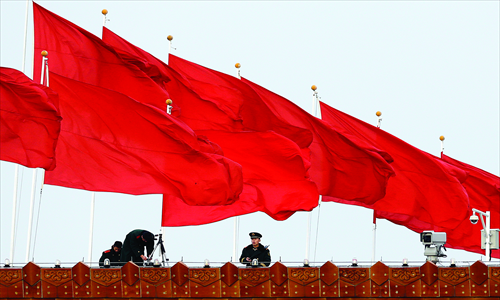China to cut reform hurdles

China will eliminate all ideological and institutional hurdles in order to forge ahead with political reform, a spokesman said Wednesday, a day ahead of the 18th National Congress of the Communist Party of China (CPC).
However, the direction of this reform is not what many Western countries expect. Cai Mingzhao, spokesman for the congress, told a press conference. He added that the country will uphold the path of socialism with Chinese characteristics, which includes the leadership of the CPC under the ownership of the people and the rule of law.
Analysts said political reform may see a breakthrough first through systemic adjustments of anti-corruption efforts and democratic experiments within the Party.
A total of 2,270 people, representing 82 million Party members, will attend the congress from Thursday. The congress will introduce the new leaders of the country and set the tone for China's future development while changing the Party Constitution.
"The Communist Party of China has shown its clear-cut attitude in advancing reform and opening up," said Cai, citing President Hu Jintao's remarks in July that described emancipation of the mind as a "strong ideological weapon," and reform and opening up as the "strong driving force" to push forward the causes of the Party and the people.
China's future reforms will revolve around some important sectors, such as improving the country's basic socialist economic system, socialist market economy, basic distribution, cultural management and social management, he said.
These high-profile vows for reform and opening-up are the result of pressures from home and abroad as the country's economy continues to grow and its international status keeps rising, said Zhang Xixian, a professor at the Party School of the Central Committee of CPC.
"The 18th congress has attracted a lot of domestic and international attention," Zhang told the Global Times. "It's this time that has pushed the CPC to the upfront and which has led it to be poised to make a change."
However, Zhang said it is unlikely for China to soon undergo a major change, as the blueprint to be disclosed at the 18th congress is the result of a fine political balancing act between various forces.
Chen Jiaxi, associate professor at Contemporary Chinese Politics Research Institute of Shenzhen University, said he is expecting the CPC to make a breakthrough in its political reform by advancing intra-Party democracy.
"Democratic ways to pick officials, such as competitive elections, debates and proposing grass-roots candidates have been widely seen at the lower levels of the Party," said Chen. "We're expecting these successful experiences to be applied at the upper levels."
Fighting corruption is another major focus of the CPC's political reform.
The 18th CPC National Congress will advance the fight against corruption, spokesman Cai Mingzhao said Wednesday.
"The problems of Bo Xilai and Liu Zhijun are serious corruption cases among leading cadres of the Party, and the lessons drawn from these are profound," Cai said.
Cai said the Central Commission for Discipline Inspection of the CPC is drafting a working plan on punishing and preventing corruption between 2013 and 2017.
Bo, the former Party chief of Chongqing and member of the Political Bureau of the CPC Central Committee, was stripped from his CPC membership and expelled from public service for severe disciplinary violations and suspected crimes of bribery and abuse of power.
Liu, the former minister of Railways, had been under investigation since February 2011 when he was removed from his post.
Chen said public supervision should be expanded in order to better check possible abuses of power, as the existing supervision system has not proven highly effective.
The 18th CPC National Congress will last seven days until November 14.
Xinhua contributed to this story
Related articles:
Transition process a Chinese success story
